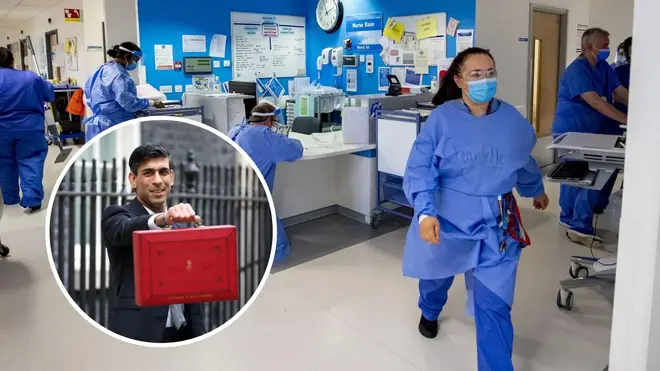
Ben Kentish 7am - 10am
24 October 2021, 22:31 | Updated: 25 October 2021, 13:12

The NHS will receive a £6 billion investment as part of the upcoming Budget to help clear patient backlogs across England.
The £5.9 billion package will support the aim to deliver around 30 per cent more elective activity by 2024-25 compared to pre-pandemic levels - equivalent to millions more checks, scans and procedures for non-emergency patients, the Treasury said.
Some £2.3 billion of the funding will be used to try to transform diagnostic services, with at least 100 "one-stop-shop" community diagnostic centres being opened across England, including the 44 already announced.
The centres are expected to help clear most existing test backlogs caused by the pandemic, including for CT, MRI and ultrasound scans, by the end of the parliament.
Additional capacity will also ensure the resilience of the country's diagnostic services in the years to come, the Treasury said.
Read more: Chancellor to announce £3bn investment in skills and education
Read more: Cities to get £7bn boost for transport

'People are on NHS waiting lists for months before they're contacted'
The settlement also includes £1.5 billion for increased bed capacity, equipment and new surgical hubs to tackle waiting times for elective surgeries.
Each hub will be equipped with four or five surgical theatres designated for critical elective surgeries.
The final £2.1 billion of the £5.9 billion total will be invested in technology and data in a bid to improve efficiency and security within the NHS.
It is hoped to help NHS staff have access to the fastest broadband, and that digital patient records will ensure patients get the best care wherever they are.
Read more: Ex-NHS staff nurse 'terrified' and 'sad' as Covid cases rise

Senior lawyer on cases backlog
Chancellor Rishi Sunak said: "We are committed to getting health services back on track and ensuring no one is left waiting for vital tests or treatment.
"This is a game-changing investment in the NHS to make sure we have the right buildings, equipment and systems to get patients the help they need and make sure the NHS is fit for the future."
The £5.9 billion funding comes on top of the Government's plan to spend £8 billion to tackle the elective backlog over the next three years, and the £97 billion additional funding the Government has provided to support health and care since the start of the pandemic, the Treasury said.
Read more: Over 100 MPs make pre-budget plea for Rishi Sunak to slash beer duty
Meanwhile, Health and Social Care Secretary Sajid Javid said the Government would do "whatever it takes" to tackle the issues faced by the health service.
"Our phenomenal NHS has worked so hard to keep people safe during the pandemic and we'll do whatever it takes to make sure people are getting the treatment they need as quickly as possible," he said.
"This £6 billion investment will support the delivery of millions more checks, scans and procedures for patients across the country.
"Business as usual won't be enough, that's why we are going to reform care with more community diagnostic centres, new surgical hubs and the latest technology to help recover NHS services by tackling waiting lists."

NHS backlog leading to cancer going untreated 'barbaric'
It comes as part of more than £20 billion already announced in plans ahead of the Budget on Wednesday.
The Department of Health and Social Care will receive another £5 billion to fund research and development in areas such as genome sequencing and tackling health inequalities over the next three years.
Another area set to benefit from the review is the education sector, which will receive £3 billion as part of what the Government has called a "skills revolution".
A further £7 billion is set to give transport links across the country a boost, with projects ranging from tram improvements to introducing improvements in infrastructure, fares and services.